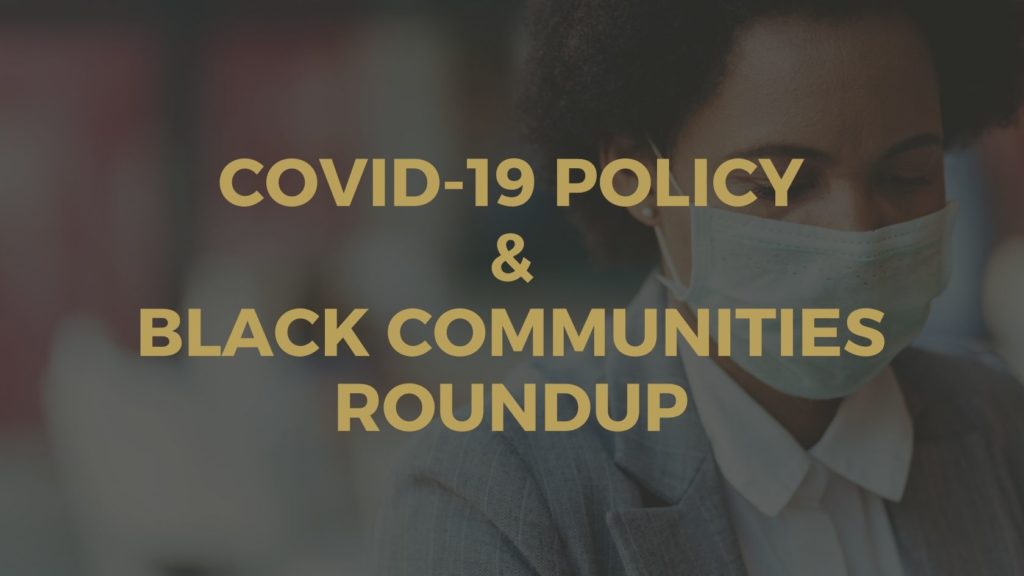
July 28 COVID-19 Policy & Black Communities Roundup
Senate Republicans Release Stimulus Plan
Which Democrats Call “Woefully Inadequate”
Yesterday Republicans released key parts of their stimulus plan—the HEALS Act (health, economic assistance, liability protection, and schools). Instead of including a flat $600 per week federal unemployment benefit (which is set to expire this Friday), the bill would set the sum at $200 per week through September, and then move to 70% of a worker’s previous wages up to $500 per week. The bill also includes: a one-time payment of $1200 per individual (for those who earn less than $75,000); immunity from lawsuits for businesses absent gross negligence or willful misconduct; $190 billion for Paycheck Protection Program loans; $105 billion to help schools reopen; $16 billion for enhanced COVID-19 testing; $26 billion for vaccines and therapeutics; and tax credits for retaining employees, workplace testing, and safety upgrades.
Democratic Leader Chuck Schumer responded “[f]rom what has been reported, the GOP is drafting a woefully inadequate COVID proposal with nothing on rental assistance, hazard pay for essential workers, aid to state, local, and tribal governments, or investments in communities of color.”
Last week, Democrats expressed outrage over the Republicans “dithering for months” while the clock is running out on existing coronavirus relief efforts. The House passed the $3 trillion HEROES Act two months ago, which would extend the $600 per week unemployment benefit throughout the year.
The federal moratorium on evictions enacted in the March CARES Act expired last week. An estimated “12.3 million households, or about 30 percent of all renters nationwide,” were eligible for this protection. Concerns that the end of the moratorium will spark a massive increase in evictions were underscored by a U.S. Census Bureau survey in early July that found that 24 million Americans saw “little to no chance of paying next month’s rent.”
Of the total $660 billion allocated as Paycheck Protection Program Funds, as of July 23, $519 billion in loans had been distributed and the average loan size was $104,109. The deadline to apply for a PPP loan has been extended to August 8.
For more on Congress and the COVID-19 stimulus this week, see the National Urban League’s Washington Bureau Insider.
Other Key Black Federal Policy Issues
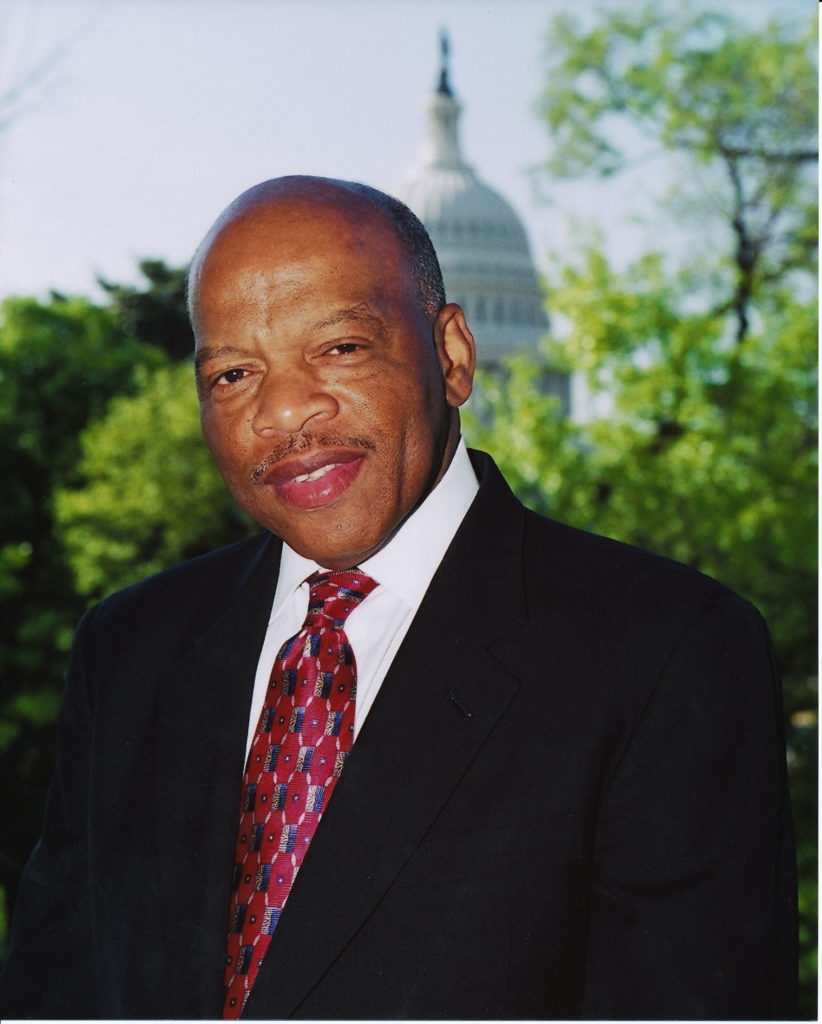
Dems Propose Naming Voting Rights Expansion to Honor John Lewis. Led by Majority Whip Jim Clyburn (D-S.C.), House Democrats are discussing plans to renew and expand the Voting Rights Act of 1965. The legislation would be named the John R. Lewis Voting Rights Act of 2020 to honor the late civil rights champion and Member of Congress from Georgia, who was memorialized at the U.S. Capitol yesterday. Click here for the Joint Center’s statement on the passing of Congressman Lewis.
Economic Studies & COVID-19
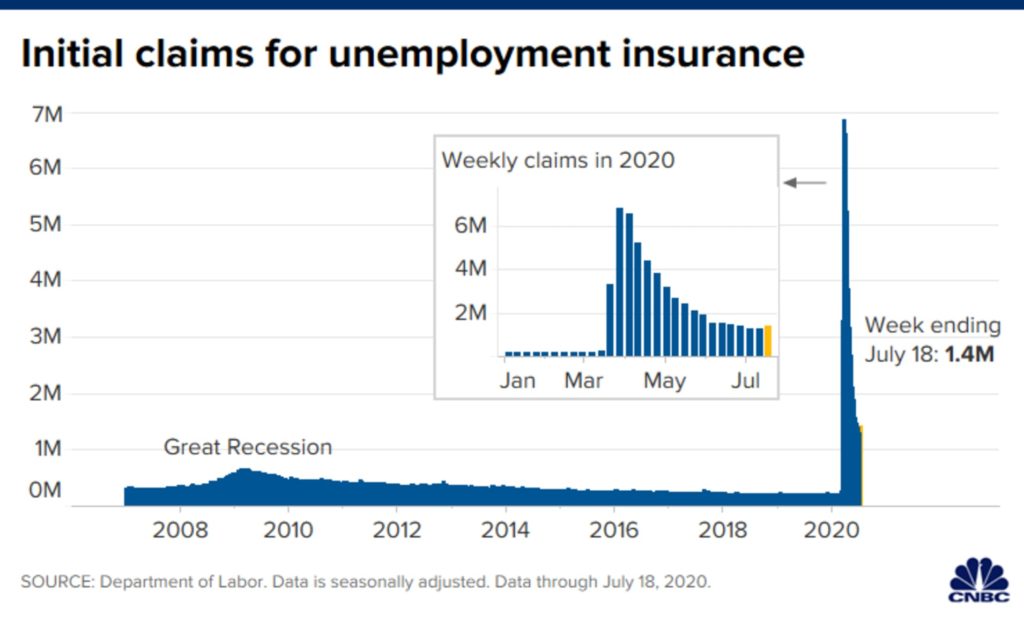
Weekly unemployment claims have begun to rise, with another 1.4 million initial claims filed in the week ending July 18. This was up 109,000 claims from the previous week and still significantly higher than the pre-coronavirus pandemic high of 695,000 in 1982.
Unless the U.S. Senate takes swift action to extend funding, the additional $600 supplement for jobless benefits will expire on Friday. The Economic Policy Institute raised concerns that Black families will be among those most affected by the loss because the impacts of systemic racism have left them with less wealth to sustain themselves through the crisis. The JP Morgan Chase Institute estimates that the expiration of benefits will lead to large household spending cuts that will hurt the economy.
In a recent report, LIFT and the Center on Budget and Policy Priorities (CBPP) identified that “more than half of Black women with incomes below $35,000 report losing employment income since the pandemic started.” The organizations urge Congress to create a flexible emergency fund of at least $10 billion, provide funds for housing assistance, increase the maximum SNAP benefit by 15%, and expand unemployment insurance.
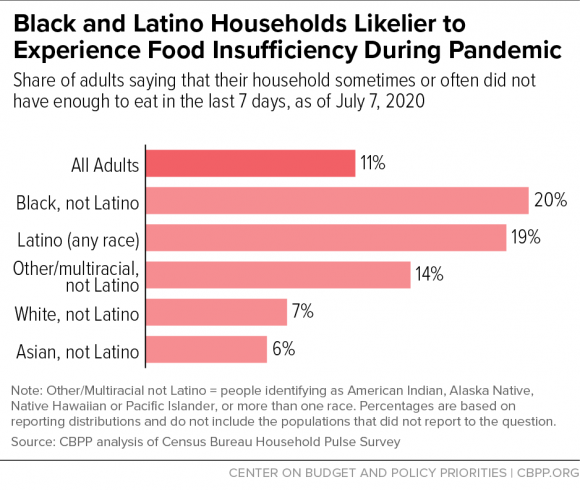
Black families are struggling more than white and Latino families according to an analysis of Household Pulse data by the Center on Budget and Policy Priorities (CBPP). Black adults have reported difficulties in getting enough food in their households (at a rate of 20 percent, compared to 19%for Latino respondents and 7% for white respondents). Black renters also reported being behind on rent (at 30%, compared to 23% for Latino renters and 13% for white renters.) In response, the CBPP encouraged Congress to pass a robust stimulus package to help struggling families and states, localities, tribal nations, and U.S. territories.
Twenty thousand workers walked off the job in 160 cities for the Strike for Black Lives last week. The strike included events across the country, and was organized and/or supported by 60 labor unions and social and racial justice organizations. Vox interviewed various workers—from fast food employees to gig workers—about their work experiences during the COVID-19 pandemic and their reasons for participating in the strike.
The Black Economic Alliance announced support of The Jobs and Neighborhood Investment Act, which would allocate $17.9 billion to Minority Depository Institutions and Community Development Financial Institutions.
Political Studies & COVID-19
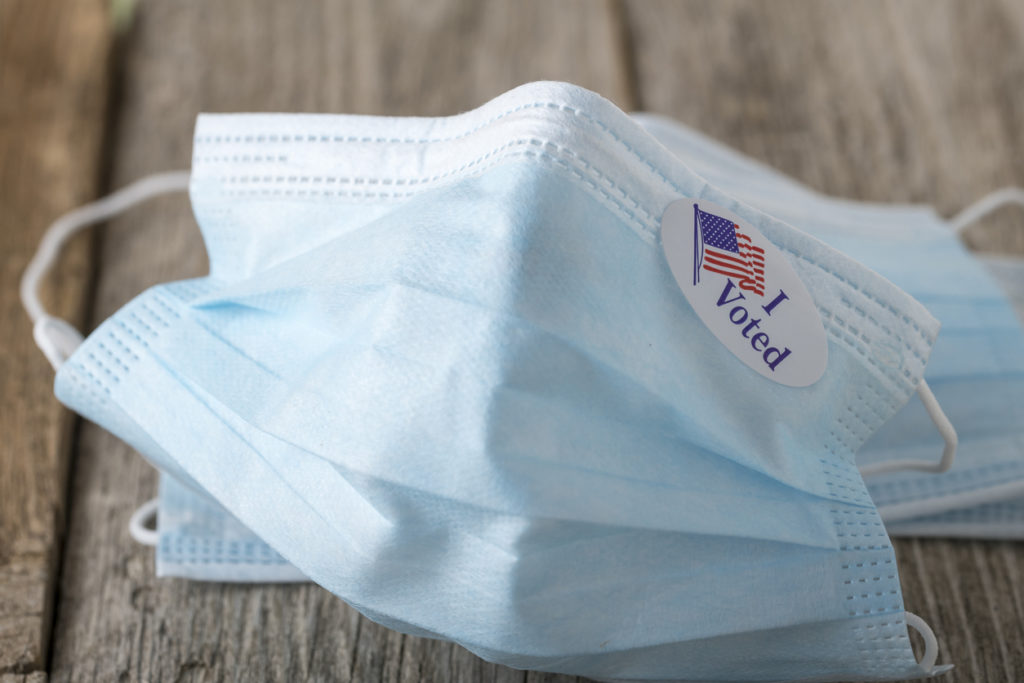
With less than 100 days until the presidential election, The Guardian highlighted challenges that election administrators face in conducting a federal election amid a pandemic. Many states have inadequate infrastructure to facilitate a mostly vote-by-mail process; election administrators are still figuring out how to offer adequate, safe in-person voting options; and small technicalities threaten to result in the rejection of many mail-in-ballots—especially among voters of color and young and first-time voters.
Last week the Senate Rules Committee held a hearing entitled “2020 General Election Preparations.” In her testimony, President and Executive Director of the National Lawyers’ Committee For Civil Rights Under Law Kristen Clarke asked the Committee and Congress “to provide the $3.6 billion in additional funding for state and local elections this year, which is a lifeline for our democracy and vital to protecting public health as COVID-19 continues to ravage communities across the nation.” She continued, “protecting our democracy also requires Congress to create certain minimal standards for voters, including at least two weeks of early voting and no-excuse absentee voting by mail.”
The Advancement Project and several other voter advocacy groups won a settlement in the state of Florida to require the state to increase awareness, especially among people of color about vote-by-mail options.
The African American Mayors Association passed a resolution urging Governors to “repeal any orders or rules prohibiting local governments from implementing and enforcing transmission mitigation strategies such as social distance practices and the use of face masks in public spaces as recommended by the CDC.” The resolution was sponsored by Mayor McKinley Price, DDS, of Newport News, VA.
According to recent data by the Centers for Disease Control and Preventions (CDC), African Americans accounted for 22.3% of COVID-19 deaths, but according to Census data only account for 13 percent of the U.S. population. In comparison, (non-Hispanic) white Americans accounted for 52.7% of COVID-19 deaths, but make up 60 percent of the U.S. population. USA Today reported that “out of the 47 states that report the race of COVID-19 victims, the most disproportionately high COVID-19 mortality rate was born by Black or African Americans in 35 states [or 74 percent].”
The National Institutes of Health (NIH) is conducting its first study to evaluate “how socioeconomic factors such as income, family structure, diet and access to healthcare affect COVID infections and outcomes,” according to the LA Times.
“Black and Hispanic people are more likely to experience longer wait times and understaffed testing centers,” according to a new nationwide study of coronavirus testing sites by ABC and FiveThirtyEight.
The Rockefeller Foundation has pledged $50 million toward COVID-19 testing improvements with an emphasis that development and implementation should prioritize Black Americans and other people of color who have been more vulnerable to the virus.

According to an analysis from Joint Center alum John Horrigan, 3.25 million Black children (living in 30.6% of Black households with children 17 and under) are in the “homework gap,” which means they are unable to receive adequate remote instruction because their families lack the home high-speed internet access required to support online learning. Also, 1.8 million Black children lack a home computer. Ensuring that children of all racial backgrounds without high-speed internet and a computer have these tools at home would cost $6.8 billion.
Movement Building
Alabama Arise urged Alabamians to contact Senators Doug Jones (D-AL) and Richard Shelby (R-AL) asking for an extension of the $600 weekly federal supplement to unemployment insurance (UI) benefits to ensure economic stability for Alabama residents and Americans at large.
Better Family Life and Colleagues in Solidarity collaborated to host a mobile food market and distribution in St. Louis, MO.
Color of Change issued a petition calling on Senators to pass the COVID-19 Compassion and Martha Wright Prison Phone Justice Act that enables the FCC’s authority to prevent prison phone corporations from charging incarcerated people and their families high phone call fees during a time when regular communication is needed.
NAACP Legal Defense and Educational Fund Inc., issued a petition demanding a national moratorium on evictions and foreclosures.
The Economic Policy Institute issued a petition to the Senate urging them to pass legislation that “provides immediate aid to states and local communities to protect critical services including education, healthcare, and first responders.”
The Leadership Conference on Civil and Human Rights and several civil rights, labor, and religious organizations urged Senators to pass legislation that addresses the health and economic consequences of COVID-19 including equal access to quality healthcare, targeted relief for marginalized communities, protections for vulnerable working people, and immigrant and citizen protections.
Events
Upcoming events include “COVID-19 and the Housing Crisis” (Black to the Future Action Fund, July 27); “NAN Youth Huddle” (National Action Network, July 27); “Retooling Your Career for a COVID & Virtual World” (Multicultural Media, Telecom and Internet Council, Charter Communications, the National Urban League, and the League of United Latin American Citizens, July 28); “Campus Conversations with President Wayne Frederick of Howard University” (Washingtonian, July 29); “The Digital Divide: Education, Race And Virtual Learning” (The Boston Globe, July 29); “A Virtual Town Hall with Poverty Advocates” (Congressional Black Caucus, July 31); “An afternoon with Stacey Abrams, Sen. Cory Booker, and Neera Tanden” (Center for American Progress Action Fund, July 31); “Shared Prosperity” (Alabama Arise, August 4).
Last week’s events were held by the CBC, Center for American Progress, Congressional Progressive Caucus Center, Education Strategy Group, Groundwork Collaborative, Knight Foundation, NAACP, New America, Oakland Athletics with Alicia Garza, One Voice MS, Politico, Poor People’s Campaign, The Boston Globe, The Rockefeller Foundation, Urban Institute, and Young Invincibles.

